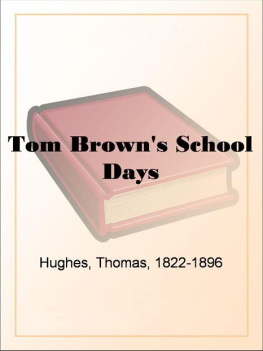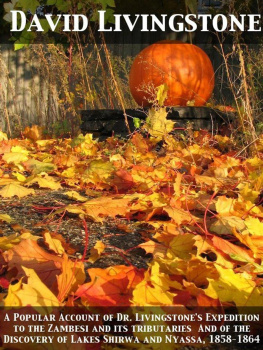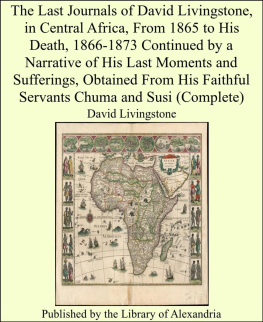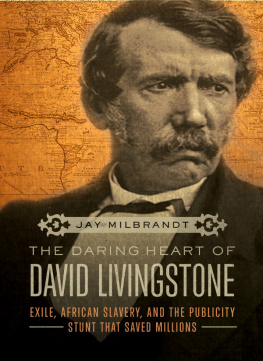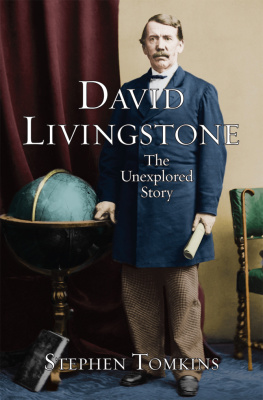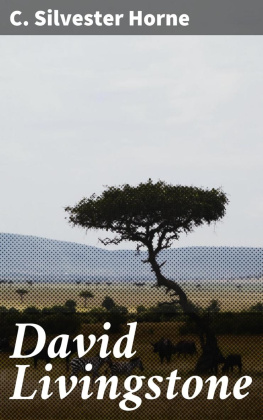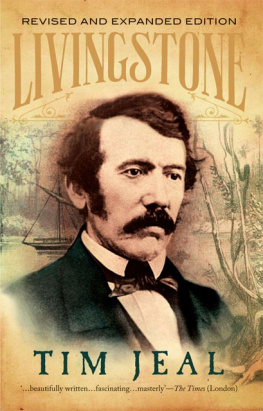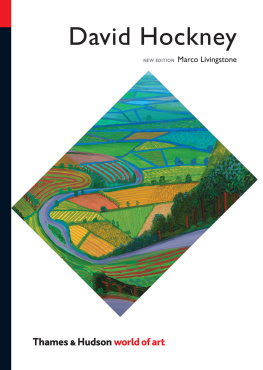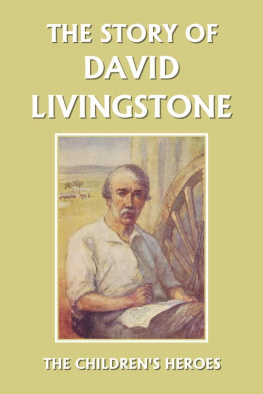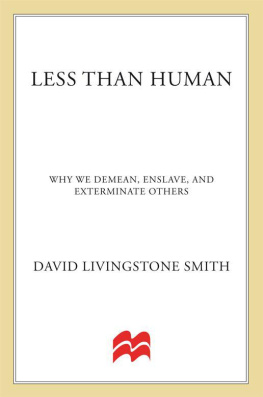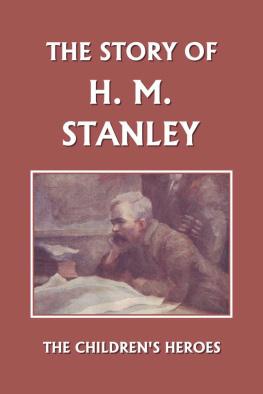Thomas Hughes - David Livingstone
Here you can read online Thomas Hughes - David Livingstone full text of the book (entire story) in english for free. Download pdf and epub, get meaning, cover and reviews about this ebook. year: 2011, publisher: Barnes & Noble, genre: Detective and thriller. Description of the work, (preface) as well as reviews are available. Best literature library LitArk.com created for fans of good reading and offers a wide selection of genres:
Romance novel
Science fiction
Adventure
Detective
Science
History
Home and family
Prose
Art
Politics
Computer
Non-fiction
Religion
Business
Children
Humor
Choose a favorite category and find really read worthwhile books. Enjoy immersion in the world of imagination, feel the emotions of the characters or learn something new for yourself, make an fascinating discovery.
- Book:David Livingstone
- Author:
- Publisher:Barnes & Noble
- Genre:
- Year:2011
- Rating:3 / 5
- Favourites:Add to favourites
- Your mark:
- 60
- 1
- 2
- 3
- 4
- 5
David Livingstone: summary, description and annotation
We offer to read an annotation, description, summary or preface (depends on what the author of the book "David Livingstone" wrote himself). If you haven't found the necessary information about the book — write in the comments, we will try to find it.
Thomas Hughess biography of David Livingstone (1813-1873) follows the legendary Scottish explorers life from his impoverished childhood to his missionary work in Africa, where he would remain for thirty years and where he discovered Victoria Falls. This is an enthralling account of Livingstones extraordinary accomplishments.
David Livingstone — read online for free the complete book (whole text) full work
Below is the text of the book, divided by pages. System saving the place of the last page read, allows you to conveniently read the book "David Livingstone" online for free, without having to search again every time where you left off. Put a bookmark, and you can go to the page where you finished reading at any time.
Font size:
Interval:
Bookmark:
THOMAS HUGHES

This 2011 edition published by Barnes & Noble, Inc.
All rights reserved. No part of this publication may be reproduced, stored in a retrieval system, or transmitted, in any form or by any means, electronic, mechanical, photocopying, recording, or otherwise, without prior written permission from the publisher.
Barnes & Noble, Inc.
122 Fifth Avenue
New York, NY 10011
ISBN: 978-1-4114-4959-6

CHAPTER I
DAVID LIVINGSTONE
181340
"M Y own inclination would lead me to say as little as possible about myself." With these words the greatest explorer of modem times begins that account of his missionary journeys and researches in South Africa which electrified England. The eager desire of his countrymen to know all they could about himself, induced him to modify his own inclination so far as to devote six pages of his famous book to the history of his family, and of the early years of his own life up to the time of his sailing for the Cape at the age of twenty-three. This reticence is as characteristic of the man as are the few facts he does disclose. Foremost of these stands: "My great-grandfather fell at the battle of Culloden, fighting for the old line of kings, and my grandfather was a small farmer in Ulva, where my father was born." Next comes: "The only point of the family tradition I feel proud of is thisone of these poor islanders, when he was on his deathbed, called his children round him and said, 'I have searched diligently through all the traditions of our family, and I never could find that there was a dishonest man amongst our forefathers. If, therefore, any of you should take to dishonest ways, it will not be because it runs in our blood. I leave this precept with you. Be honest."
Since the days of Jonadab, the son of Rechab, it would be hard to find a more striking example of faithfulness to the "family motto" than David's life furnishes. A more perfect example of a downright simply honest life, whether in contact with queens or slave-boys, one may safely say, is not on record on our planet. Happily, in this instance, it is not difficult to supplement the meagre outline sketched by the man himself, from his own letters, and the reminiscences of playmates and school-fellows.
The son of the Culloden soldier, David's grandfather, finding the small farm in Ulva insufficient for the support of his large family, crossed into Lanark in 1792, and obtained a position of trust in the mills of H. Monteith and Co., at Blantyre, on the Clyde, above Glasgow. The French wars drew away all the sons but Neil into the army or navy. Neil, after serving an apprenticeship to David Hunter, tailor, and marrying his master's daughter, Agnes, in 1810, made a small business for himself as a travelling tea-merchant.
David Hunter was a great reader, especially of religious books, of which he had a small library, amongst them the works of the Rev. J. Campbell, South African missionary, Travels among the Hottentots, etc. These took a strong hold on his son-in-law Neil Livingstone, and in turn on his grandson David, our hero, Neil's second son, a boy of remarkable powers, physical and intellectual. He was born on March 19th, 1813, and before the age of ten had wandered over all the Clyde banks about Blantyre, and had begun to collect and wonder at flowers and shells. He had also gained the prize for repeating the whole 119th Psalm "with only five hitches"! But, hard as he was in body and mind, he had a soft heart. He was watchful to lighten his mother's work when he could, generally sweeping and cleaning for her, "even under the door-mat," as she gratefully recorded, with the thoroughness which never left him. Happily for us all, no character is without its weak side, and even David would say, "Mother, if you'll bar the door, I'll scrub the floor for you," a concession this to the male prejudices of Blantyre which he would not have made in later life.
In another direction also a satisfactory gleam of human weakness is recorded, in that Davie not only climbed to a higher point in the ruins of Bothwell Castle than any other boy, but carved his name up there.
At ten the boy went into the cotton-mills as a piecer, from which time he maintained himself, and found money for books such as only Scotch peasants are in the habit of buying voluntarily. Out of his first week's wages he bought Ruddiman's Rudiments, and from that time pursued the study of Latin with his usual steadfastness. His factory work began at six A.M . and lasted till eight P.M ., when Davie went to his Latin, as soon as he had had his tea, until ten with the schoolmaster provided for the workpeople by their employers, and afterwards at home till midnight, or until his mother put out his candle. But though he thus became able to read his Virgil and Horace easily before he was sixteen, his chief delight was in science. He managed to scour the country for the simples mentioned in the first medical treatise he became possessed of, Culpepper's Herbal, "that extraordinary old work on astrological medicine." "I got as deep into that abyss of fantasies," he records, "as my author said he dared to lead me." It seemed perilous ground to tread on further, indeed the dark hint of selling soul and body to the devil loomed up before Davie's youthful mind. On one of his exploring rambles, in company with two brothers, one now in Canada and the other a clergyman in the United States"from which we generally returned so hungry and tired that the embryo parson often shed tears"they came on a limestone quarry. "It is impossible to describe the wonder with which I began to collect the shells in the carboniferous limestone. A quarryman watched me with the pitying eye which the benevolent assume when viewing the insane. 'However,' said I, 'did those shells come into those rocks?' 'When God made the rocks He made the shells in them,' was the damping reply."
Without going more deeply into astronomical botany or other cabalistic lore than became a young Highlander whose father had left the Established Church and become deacon of an Independent Chapel, Davie managed in his Saturday half-holidays, and the rare occasions when a flood of the Clyde stopped the millsan occurrence which, in spite of his thrift, he could not help rejoicing into make notable collections of the flora of Lanarkshire, and the fossils of the carboniferous limestone, while devouring his classics and all the poets he was allowed to read. One can only regret that Deacon Neil's principles forbade novels, so that his great son never read the Waverley series till many years later. "My reading in the factory," he says, "was earned on by placing the book on a portion of the spinning jenny, so that I could catch sentence after sentence as I passed at my work. I thus kept a pretty constant study, undisturbed by the roar of machinery. To this I owe the power of completely abstracting my mind, so as to read and write with perfect comfort amidst the play of children or the dancing and song of savages."
It must not be inferred, however, that Davie was a mere precocious bookworm, and averse to such sport as could be had. On the contrary, he delighted in rough play, ducking his comrades in fun as he swam past them in the Clyde, in whose waters he was a skilful fisher. In those early days the trout, and all other fish but salmon, were unpreserved. One day Davie caught a fine salmon. Luckily brother Charlie wore on that day a large pair of the family trousers, in a leg of which the "muckle fush" was smuggled home. The deacon forgave them, after stern monition to take no more salmonand, the family ate this one for supper.
Font size:
Interval:
Bookmark:
Similar books «David Livingstone»
Look at similar books to David Livingstone. We have selected literature similar in name and meaning in the hope of providing readers with more options to find new, interesting, not yet read works.
Discussion, reviews of the book David Livingstone and just readers' own opinions. Leave your comments, write what you think about the work, its meaning or the main characters. Specify what exactly you liked and what you didn't like, and why you think so.


